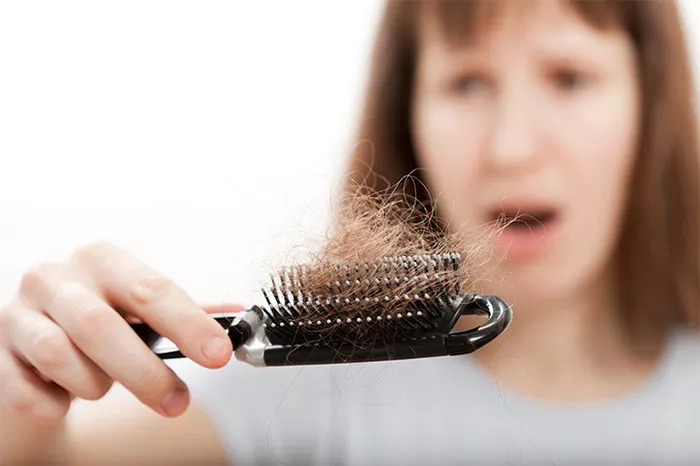The birth of a child is a joyful and transformative experience for many women, but it can also bring about unexpected physical changes, including postpartum hair loss. This phenomenon, also known as postpartum alopecia, affects a significant number of women in the months following childbirth. Understanding the causes of postpartum hair loss and exploring potential solutions, including the role of vitamins, can help new mothers navigate this aspect of the postpartum experience with confidence and ease.
Explanation of Postpartum Hair Loss:
Postpartum hair loss is a common condition characterized by excessive shedding of hair in the months following childbirth. While pregnancy often brings about thicker, fuller hair due to hormonal changes, the postpartum period can result in the opposite effect. This is largely attributed to fluctuations in hormone levels, particularly estrogen and progesterone, which can disrupt the hair growth cycle.
During pregnancy, elevated levels of estrogen prolong the growth phase of the hair cycle, resulting in reduced shedding and thicker hair. However, after childbirth, estrogen levels drop dramatically, causing more hair follicles to enter the resting phase of the cycle. This shift leads to increased shedding and the appearance of thinning hair, which can be alarming for many new mothers.
Role of Vitamins in Hair Health:
While postpartum hair loss is a natural and temporary condition for most women, certain vitamins and minerals play a crucial role in supporting overall hair health and may help alleviate symptoms of hair loss. These nutrients are involved in various aspects of hair growth and maintenance, including the production of keratin, the protein that makes up hair strands, as well as the promotion of scalp health and circulation.
Recommended Vitamins:
1. Vitamin A: This essential vitamin plays a vital role in the growth and development of cells, including those in the hair follicles. Adequate intake of vitamin A promotes a healthy scalp and supports the production of sebum, a natural oil that moisturizes the scalp and keeps hair strands lubricated.
2. Vitamin C: As a powerful antioxidant, vitamin C protects hair follicles from damage caused by free radicals and oxidative stress. It also aids in the absorption of iron, another important nutrient for hair health, and contributes to the production of collagen, a protein that strengthens hair strands.
3. Vitamin D: Research suggests that vitamin D receptors are present in hair follicles, indicating a potential role in hair growth regulation. Adequate levels of vitamin D may help prevent hair loss and promote the development of healthy, strong hair.
4. Vitamin E: Known for its antioxidant properties, vitamin E helps protect hair follicles and scalp tissue from damage. It also promotes blood circulation to the scalp, ensuring that hair follicles receive essential nutrients for optimal growth.
5. Biotin: Also known as vitamin B7, biotin is perhaps the most well-known vitamin for hair health. Biotin supports the production of keratin and may help strengthen hair strands, reduce shedding, and promote healthy hair growth.
6. Iron: Iron deficiency is a common cause of hair loss, particularly in women. Iron is necessary for the production of hemoglobin, a protein in red blood cells that carries oxygen to tissues, including the scalp. Adequate iron intake ensures that hair follicles receive oxygen and nutrients for optimal function.
Scientific Evidence:
Numerous studies have explored the potential benefits of vitamins and minerals for hair health, including their role in managing postpartum hair loss. For example, a study published in the Journal of Clinical and Aesthetic Dermatology found that supplementation with a combination of biotin, zinc, and other nutrients improved hair growth and reduced shedding in women with temporary hair thinning.
Another study published in the International Journal of Trichology examined the effects of a nutritional supplement containing vitamins, minerals, and amino acids on hair loss in women. The researchers observed a significant reduction in hair shedding and an improvement in hair density after six months of supplementation.
Dosage and Safety:
While vitamins can play a valuable role in supporting hair health, it’s essential to follow recommended dosages and safety guidelines, especially for breastfeeding mothers. Excessive intake of certain vitamins, such as vitamin A, can have adverse effects and may even be harmful during pregnancy and lactation.
Consultation with Healthcare Providers:
Before starting any new supplement regimen, particularly during the postpartum period, it’s crucial for women to consult with their healthcare providers. A qualified healthcare professional can provide personalized recommendations based on individual health status, dietary habits, and potential risk factors.
Alternative Solutions:
In addition to vitamins and minerals, there are other non-vitamin related treatments and practices that may help manage postpartum hair loss. These include:
1. Scalp massage: Gentle massage of the scalp can stimulate blood circulation and promote the delivery of nutrients to hair follicles.
2. Nutrient-rich diet: Consuming a balanced diet rich in protein, fruits, vegetables, and whole grains provides essential nutrients for hair health.
3. Stress management: High levels of stress can contribute to hair loss. Practicing relaxation techniques such as yoga, meditation, or deep breathing exercises may help reduce stress levels and promote hair growth.
4. Avoiding harsh hair treatments: Limiting the use of heat styling tools, chemical treatments, and tight hairstyles can prevent further damage to fragile postpartum hair.
Conclusion:
Postpartum hair loss is a common and temporary condition experienced by many women after childbirth. While it can be distressing, understanding the underlying causes and exploring potential solutions, including the role of vitamins and minerals, can help alleviate symptoms and promote healthy hair growth. By incorporating nutrient-rich foods, considering supplementation under medical guidance, and adopting healthy lifestyle practices, new mothers can support their hair health and embrace the postpartum journey with confidence and resilience.


